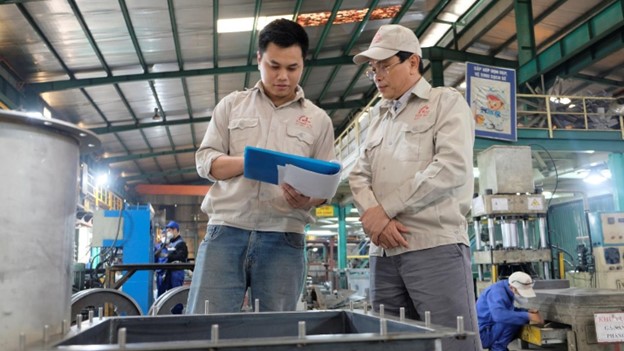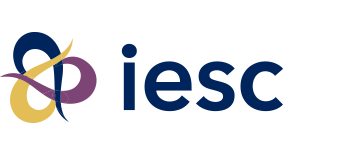How USAID Is Mapping a Path to Digital Transformation For Businesses in Vietnam
TOMECO, a Champion of Change

Le Quy Kha, Chairman of TOMECO An Khang (right), discusses barcode and traceability application with the company’s Head of Continuous Factory Improvement
Photo courtesy: Tran Luong Thai, TOMECO An Khang
Small and medium enterprises in Vietnam were hit hard by the economic effects of the COVID-19 pandemic, and TOMECO An Khang is no exception. Founded in 1993 TOMECO grew from a mechanical repair workshop to a successful producer of environmental decontamination equipment, agriculture dryer machines, and industrial fans. The impact of the pandemic on supply chains and demand, however, left the company reeling, with 2020 revenue down by more than 24 percent compared to the previous year. Mr. Kha, TOMECO’s Chairman, was searching for ways to bounce back from the pandemic and to ensure job security for its 150-plus employees.
One such route was digital transformation, the full-scale incorporation of computer-based technologies into a company’s products, processes, and strategies. But Mr. Kha was initially hesitant, as earlier attempts at fast-forwarding information technology had proved disappointing.
“In 2012 and 2017, we invested nearly $26,000 to buy software to improve our production and business,” Mr. Kha said. “But we found that the software was not as effective as we expected due to our management and production processes and our inexperience with digital tools.”
Mr. Kha was inspired to recommit to the digital transformation of his company at a workshop in 2021 co-hosted by The United States Agency for International Development (USAID) and Vietnam’s Ministry of Planning and Investment (MPI). Listening to how USAID and MPI have been supporting Vietnamese SMEs accelerate their digital transformation, Mr. Kha was motivated to register for one-on-one, follow-up support from USAID to illustrate the achievability and benefits of digital transformation through the development and implementation of a comprehensive digital transformation roadmap.
“The solution was to first identify a roadmap for the digital transformation of our company,” said Mr. Kha. With support, TOMECO reviewed its current system used in planning and monitoring its company resources for production and operation, detected shortages, and developed action plans for improving and upgrading the system. It also launched a customer relationship management system that improved engagement and tracking of customers of its industrial fans. TOMECO is also adopting a master data management system to speed up its decision-making process and a state-of-the-art cyber security system to mitigate information risks and vulnerabilities. “These solutions will enable TOMECO to master the technology and utilize the database to explore more innovative business models in the fan industry,” Mr. Kha explained.
In addition to this support, USAID assisted TOMECO to launch a system using barcodes and traceability programs that allow it to track and trace its products through the production process. This tracing capacity helps TOMECO maintain the internal integrity of its products and credibly demonstrate this to customers operating in global supply chains.
While TOMECO, its employees, and its customers have benefitted from this transformation, a broader impact is unfolding given the example it is setting for other SMEs. “A big challenge facing SMEs is that management can’t envision the needs and benefits of digital transformation. TOMECO is a Champion of Change, inspiring the Vietnamese business community, especially small and medium enterprises, to adopt digital transformation as a path to seize new market opportunities,” explained Ms. Trinh Thi Huong, Deputy Director General of the Agency for Enterprise Development at the MPI.


